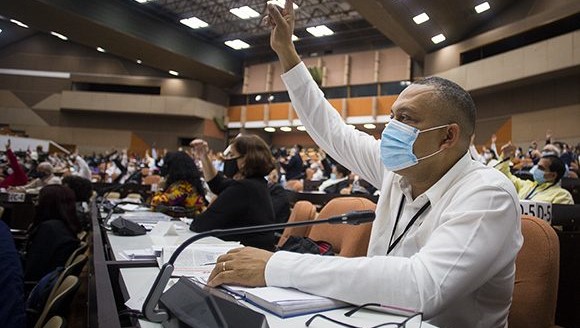This April 10 will mark two years since the entry into force of the Cuban Constitution, approved in 2019. Although the intense media campaign for a "Yes" vote, and the repression against dissident voices during the so-called "consultation process" heralded little or no change, several statements in the new Constitution, in addition to the Legislative Schedule approved in December of that year, projected an illusion of progress… for the world.
A look from the outside (which is what matters to the Cuban Government and for which it strives to generate all these mirages of change) would perceive that the current Constitution upholds the rights to freedom of assembly, demonstration and association for peaceful purposes, "with respect for public order and compliance with the regulations established by law". And the Legislative Schedule calls for the approval of high-ranking rules that will regulate these rights.
The Constitution also recognizes the right to litigate in courts in the event of the violation of constitutional rights by State officials or institutions. The law that will make it possible to exercise this right is also included on a Schedule, which also contains laws on problems of vital importance for the Cuban people, such as a new Housing Law, a new Penal Code, a new Family Code and a new Criminal Procedure Law, among other provisions.
Beyond the fact that it continues to declare socialism irreversible, and to subject society to the leadership of a sole party, it cannot be denied that the Constitution, together with the calendar of laws that complements it, projects an image of openness and concern for the people? In fact, image is, precisely, the main concern of the Cuban government.
Both the Constitution and the legislative calendar are pure window dressing —like the mock town that Grigory Potemkin slapped up to impress the Russian Empress Catherine II and the foreign delegation that accompanied her on a trip to New Russia in 1787
What has been legislated during these two years demonstrates that Cuba is a kind of tropical town a lo Potemkin, where the Government is only interested in shoring up its power. If the people receive any benefits at all, it is only as a side effect of these efforts.
Behind the constitutional and legislative facade
The Official Gazette of the Republic published 1,928 legal provisions from April 10, 2019 to April 1, 2021, none of which involved any effort to guarantee the free exercise of individual rights.
Of the 17 laws passed, none endorse the full exercise of rights enshrined in the Cuban Constitution. For example, the Electoral Law hampers the exercise of political rights of active and passive suffrage, that of revocation, and that of legislative initiative, through onerous mechanisms and prohibitions imposed on Cubans who have lost their residency, even if, in theory, they retain citizenship.
The Foreign Service Law does not concede the exercise of rights to Cubans who have left the country temporarily or permanently, and discriminates particularly against those who express dissent.
The Fisheries Law, which in theory was enacted to protect ecosystems, prevents fish from becoming a natural food source for Cubans despite shortages on an island with a historic fishing tradition.
The laws slated on the schedule related to crucial rights and problems for Cubans, were postponed. Such was the case of the Constitutional Rights Claims Law, the Criminal Procedure Law, and the Civil Procedure and Housing Law, among others.
The excuse of the Covid-19 pandemic would be valid for this postponement if the Law of the President and Vice President of the Republic had not been approved in October 2020, originally planned for December; and if the construction of hotels had not continued despite the pandemic, the housing deficit, and the number of women with minor children who have begun to squat on State premises.
Among the 50 decree-laws approved, none to regulate the rights of demonstration and assembly was included. The controversial Decree-Law 370 regulates the freedoms of expression, information and communication on the Internet only to restrict them, with this being justified invoking the supposed good of society, national security and defense.
Decree-Law 365 demonstrates the determination of the Cuban Government to restrict all possible freedoms and grant only those essential for it to remain in power, forcing agricultural cooperatives to be linked to state agricultural and sugar companies, and prohibiting them from joining political and social organizations other than those recognized by law.
Further demonstrations of excessive control by the Government, and its need to limit the prosperity of Cubans, are Resolutions 559/2020 of the Ministry of Agriculture, and 177 and 212 of the Ministry of Tourism, which authorize and establish rules for direct commercialization between the Tourism sector and the Basic Production Units, the Agricultural and Credit and Services
Cooperatives, and small farmers
Even though the Tourism sector sells its products in MLC, it pays farmers in national currency, and the rules prohibit any contractual agreement on the type of currency between the parties.
These are just three of the 1,355 resolutions passed during the period. More than 80 correspond to the Tarea Ordenamiento, which has driven up inflation and hunger in the country.
Of the 75 Presidential Decrees, almost all of them have involved official signs of mourning and the approval of regulations clarifying the application of laws and decrees restricting rights by their very nature. Only the Program for the Advancement of Women has any positive implications for the population.
The National Assembly’s 62 Agreements ratify decisions of the Council of State. Two have to do with the initial proposal of the Legislative Schedule and its readjustment. They did not care that the readjustment means more delays to approve rules related to fundamental rights, as the National Assembly is so subservient to the Council of State, and so out of touch with the people it is supposed to represent, that it did not even stop to consider the effects of this delay on the dire housing situation in the country.
